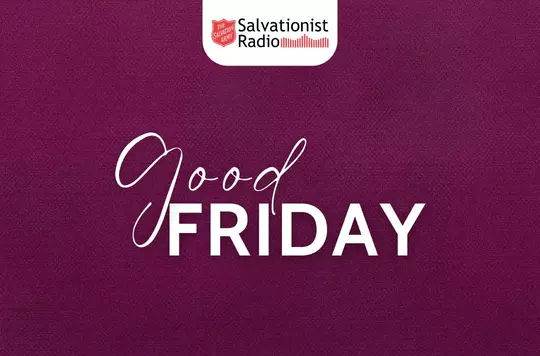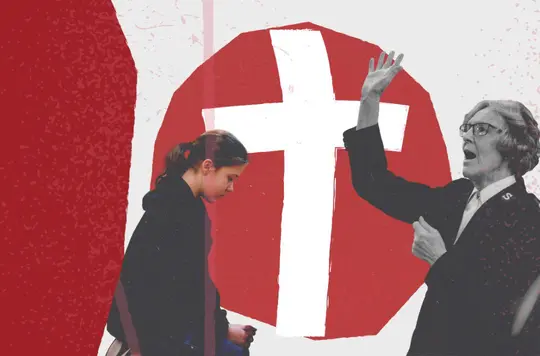23 March 2024
Good Friday: In the middle
Lieut-Colonel Alan Burns
Lieut-Colonel Alan Burns reminds us that Jesus chose the path to suffering and death.
Key text
No one likes to be caught in the middle – of a quarrel, of the road, of a sleepless night or on the fence you find yourself sitting on. In the game Piggy in the Middle, the ball is always in the hands of others.
When placed in the middle, we often have two options or paths before us. In Gethsemane, the middle place could be described as your will or mine – ‘yet not my will, but yours be done’ (Luke 22:42). Luke describes the ‘anguish’ of Jesus (v44). It might be that you have experienced such times as you wrestled with God’s will for you.
Pause and reflect
- Can you recall a time where you found yourself in that ‘middle place’, when an important choice had to be made?
- How did you feel?
Gospel writers Luke and John inform us that Jesus’ cross was erected on Golgotha (see Luke 23:33; John 19:17 and 18) and was placed as the middle one of three crosses. Two criminals died with Jesus, one on his right and the other on his left. The innocent victim, Jesus, was placed in the middle.
The two criminals were divided by their respective attitudes, and thus their ultimate destinies. One criminal was defiant and belligerent. He mocked and insulted Jesus. The other was contrite and repentant. Jesus listened to both and responded to the penitent criminal, telling him that he would be with him in Paradise.
It is said of the criminals that one was saved so that all might know that none need perish. The other criminal perished, so that none need presume.
The cross of Jesus stands in the middle of humanity, pulling everything together in reconciling love and grace. The divisive and destructive powers of evil that result in suffering and separation are defeated by the love of God.
In the Temple, the curtain that divided the Holy of Holies from the other courts, where unholy people met, was split down the middle as Jesus died (see Luke 23:45). The tearing of the curtain was a sign that the division between God and humanity was over. As the material ripped apart, it became clear that God never stopped loving us. Evil did its worst. No amount of evil that we might inflict on one another or on ourselves can separate us from God’s love (see Romans 8:35–39).
When Jesus was hung on a cross to suffer and die, the disciples could not understand what was happening. This was not what they expected – the middle, less obvious way.
The Jews, God’s chosen people, saw only one way for God to work his salvation plan – a victorious, all-conquering Messiah who, by conventional or supernatural means, would overthrow the ruling and oppressive Roman authorities. With a show of God’s mighty strength and power, the Messiah would be the conquering hero that would elevate the Jews to their rightful place – the top. When that possibility was taken away and this Messiah died on a Roman cross, everything collapsed and hope vanished, even for Jesus’ followers.
Jesus, however, was on a different path. He understood that, during the Holy Week that lay ahead, the most important response he could make was to do his Father’s will. He knew that there was more than one way for God’s Kingdom to come, and that often the will of God lies outside the parameters of people’s plans.
Many people want to live their lives their way. It’s the only way they are prepared to accept. It takes wisdom to trust God and to accept the truth of Scripture: ‘For my thoughts are not your thoughts, neither are your ways my ways’ (Isaiah 55:8).
Followers of Jesus are called to lay down their lives and forsake the ‘my way’ of selfish ambition, accepting that, in the words of Stanley Ditmer: ‘His way is best, you see;/ I’m in his hands’ (SASB 848).
Pause and reflect
- Why might we choose our way instead of God’s way?
- When is that choice most difficult?
In challenging circumstances, it can be difficult to trust God for what we cannot see or understand. When events are out of our control, and tough choices and decisions must be made, we struggle to discern God’s ‘good, pleasing and perfect will’ for us (Romans 12:2). Sometimes this means letting go and sacrificing our preferences to do what we know God requires of us. We must die to self rather than seek to be in the limelight, to be noticed and elevated above others or to always be right.
This is the path to God’s will – the middle way. No guarantee is given that things will turn out as we might wish. However, it is the path where God is working with our very best interests in mind (see Romans 8:28). This is the way of the cross. This is what Jesus meant when he said: ‘Whoever wants to be my disciple must deny themselves and take up their cross and follow me’ (Matthew 16:24).
St Teresa of Avila said: ‘If you seek to carry no other crosses but those whose reason you understand, perfection is not for you.’ Rather, taking the path of the cross allows us to become our true selves.
By dying in the middle, Jesus did not only win a victory: he was the victory. Jesus’ promise to the repentant criminal was: ‘Today you will be with me in Paradise’ (Luke 23:43). Everything comes together in Christ.
Bible study by

Lieut-Colonel Alan Burns
Retired Officer, Highcliffe
Discover more

Salvationist Radio shares a Good Friday meditation as we take time to reflect on Jesus' love and mercy.

Devotions, articles and resources to help you journey through Lent and celebrate Easter.


